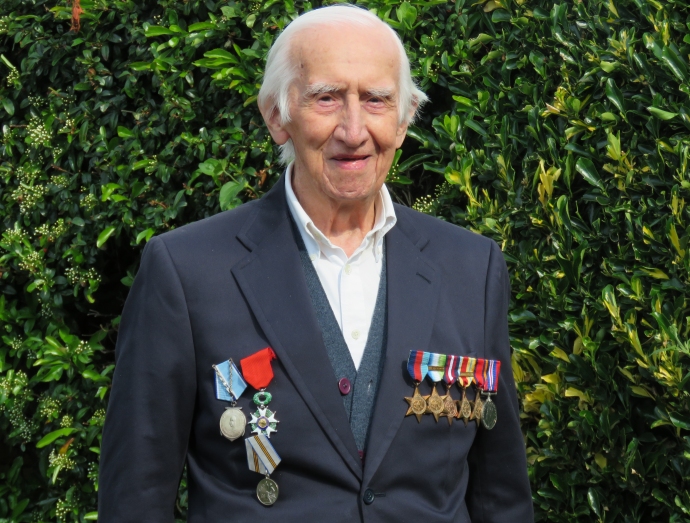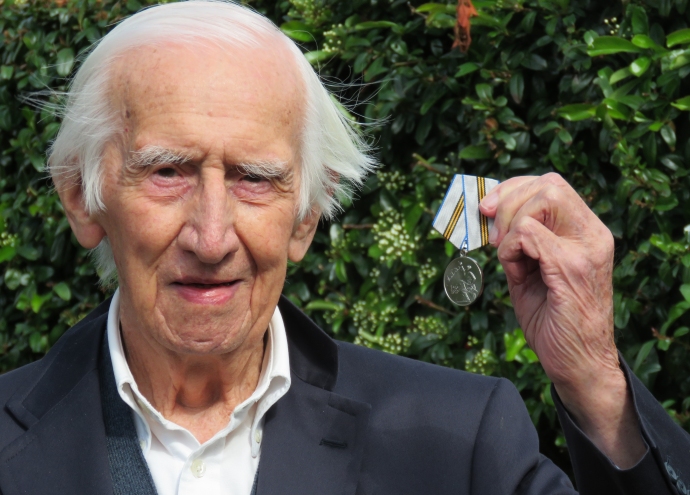A Burnham-On-Sea war veteran has been awarded a prestigious medal by the Russian government for his brave role in helping to defeat Nazi Germany 75 years ago.
Tony Winterburn, 94, served in the Merchant Navy, helping to transport aid to Russia in the Arctic Convoys in 1943 during the Second World War.
He received an Arctic Star from the Russian government in 2006 to recognise his bravery, as featured here, and in 2007 he received a Civic Award.
Tony says he was contacted by the Russian ambassador about the award in the run-up to the anniversary of VE Day. He has received the commemorative medal to mark ‘The 75th anniversary of the victory in the Great Patriotic War 1941-1945.’
Talking to Burnham-On-Sea.com this week, he said: “It’s a huge honour and a wonderful surprise. As a 17 year-old I was one of the youngest crewmembers, but at that age you don’t understand the risks. It was all an adventure for me.”
“I appreciate that I was fortunate not have been hurt at all. Our ship got to Murmansk in one piece but came under attack in an inlet. We had to abandon the ship and take to the lifeboats, but fortunately I escaped injury.”

Russian Ambassador Andrei Kelin says in a letter to Tony: “It is a great honour for me to thank you and your comrades-in-arms on behalf of the Russian government for what you did to help defeat Nazi Germany 75 years ago.”
“Russian people do remember the dramatic and heroic story of the Arctic Convoys – a period of unique collaboration between Russia and Britain.”
“From August 1941 to May 1945 the convoys delivered more than 4 million tonnes of cargo to Russia including at least 7000 aeroplanes, 5000 tanks, trucks, fuel, food, medicine, clothes, metals and other raw material. Thousands of Allied seamen lost their lives as the British ships sailed in the stormy waters of the Arctic Ocean under a constant threat from German U-boats and aircraft.”
“Your heroism and courage will always be remembered. We strongly believe that this inseparable bond between our two nations should be preserved. This year the world commemorates the 75th anniversary of the victory in World War Two.”
“The Russian Government finds it extremely important to recognise those who contributed to the victory, both in Russia and overseas. On this occasion Russian authorities have issued a special commemorative medal that is being awarded to the Russian veterans as well as members of the Allied forces who were previously decorated with Russian awards.”
“On the instruction of the President of the Russian Federation I have the honour to present to you the commemorative medal ‘75 years of victory in the Great Patriotic War 1941-1945’ and wish you and your family good health and all the best.”
Tony Winterburn recalls serving in the Arctic Convoy
Tony’s story started on 7th of January 1943.
“With 9 months sea time behind me, I joined ‘Empire Portia’ in Tyne dock as third radio officer. It was my 17th birthday. She was brand new and facing her maiden voyage. On the 17th of January we left Loch Ewe bound for Murmansk with 15 ships in convoy plus a large escort. The weather was reasonable for the season but to the north and east of bear island it was very cold. We were lucky as regards enemy action and with U boats driven off by our escorts and a failed torpedo bomber attack we were able to sail into Kola on 27th of January without loss.”
“Convoy RA-52 sailed two days after we arrived and RA-53 on 1st of March. Destiny or better-said misfortune prevented us from sailing as planned with RA-53. After waiting some time for a berth, we finally discharged the cargo of war material and loaded a part cargo of 1000 tons of cotton in bales and a small amount of timber. We then went to an anchorage in Saida Bay to await the returning convoy’s departure. During our wait, ‘Empire Bard’ came alongside and loaded us with a crated Hurricane fighter plane which had been damaged and was being returned for repair.”
“Murmansk and the surrounding district was under regular air attack and, some days after anchoring, we became a target for an ME109, whose 500lb armour piercing bomb hit just forward of the bridge. The bomb exploded below decks in #2 hold blowing a hole below the waterline in the hull plating and setting the cotton on fire.”
“This resulted in the ship taking water and listing almost immediately to some 30 degrees to port. The crated Hurricane was blocking our path to the seat of the fire, and besides having no adequate gear for moving it, we had precious little time. The deck plating was becoming red hot. The bridge itself acting as a sort of chimney, and was quickly beset with fire. We abandoned ship in the portside lifeboats and were picked up by a Russian tug which partly extinguished the fire and towed the ship into shallow water to prevent it from sinking.”
“After a period in Polyarnoe hospital and an even longer period lodging aboard other ships I was able towards the end of April rejoin ‘Empire Portia’. The hole in the hull Had been patched up and temporary accommodation built in the shell of the bridge structure. The fire had however destroyed the radio room, leaving us with no radio equipment. The ship was again placed alongside the quay for loading and are berth was just astern ‘Ocean Freedom’ which lay on the bottom with just her bridge structure showing above water. In a convoy subsequent to PQ17, she had been hit whilst at the jetty in Murmansk. The ROs in ‘Empire Portia’, Realise ING that the radio gear was probably undamaged rigged with the help of the bosun hey gang way over to the bridge of the ‘Ocean Freedom’ and brought the much needed radio equipment back to the ship.”
“By now we knew that convoys to North Russia had ceased for the time being. The lame ducks – ships that had missed the last returning convoys for one reason or another – were sailed to Archangel to avoid the constant air attacks on Murmansk. There, ‘Empire Portia’ was moored alongside at Bacharitza along with heavy lift ships and a Norwegian tanker where it stayed for a further six months. Our adventures during this period are another story but on November 1st 1943 we joined convoy RA54A and returned almost without incident to the Tyne, arriving about the 16th 17th November, a ship quite different to the one that left the builders yard in pristine condition 12 months earlier , complete with the ‘Ocean Freedom’s’ radio gear.”







